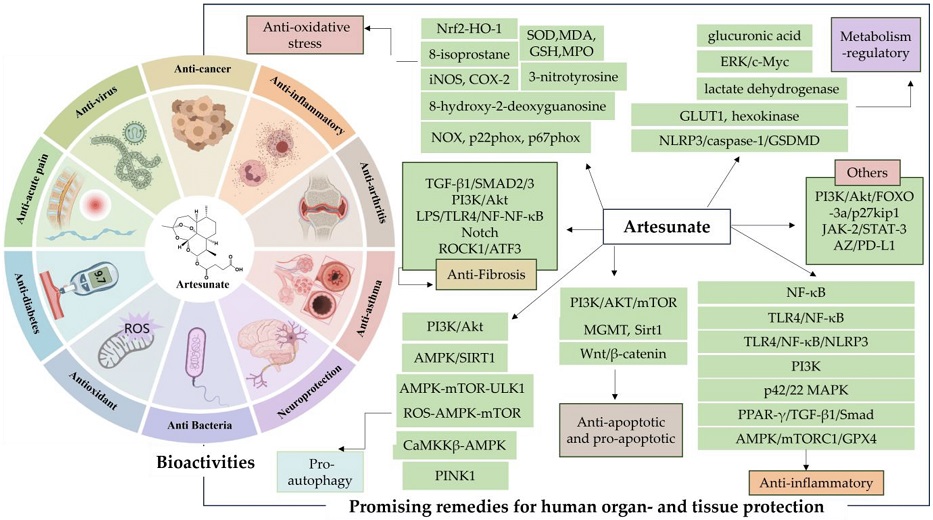Herbs And Phytochemicals: Artesunate - A New Guardian for Organ and Tissue Health
Nikhil Prasad Fact checked by:Thailand Medical News Team Jun 05, 2024 10 months, 3 weeks, 19 hours, 40 minutes ago
Herbs And Phytochemicals: Exploring the Multifaceted Benefits of Artesunate in Modern Medicine
The human body is a complex network of organs and tissues working in harmony to maintain overall health. Recently, research has highlighted the remarkable protective effects of artesunate (AS) on various organs, including the heart, liver, brain, lungs, kidneys, gastrointestinal tract, and bones. This natural compound has shown promise in preventing organ damage by regulating oxidative stress, inflammation, autophagy, apoptosis, and fibrosis. In this comprehensive review covered in this
Herbs And Phytochemicals news report, researchers from Heilongjiang University of Chinese Medicine-China and Guangdong Pharmaceutical University, Guangzhou-China delve into the mechanisms behind AS’s protective properties and its potential applications in medicine.
 Artesunate - A New Guardian for Organ and Tissue Health
Artesunate’s Role in Combating Major Diseases
Artesunate - A New Guardian for Organ and Tissue Health
Artesunate’s Role in Combating Major Diseases
Recent years have seen an increase in diseases such as lower respiratory tract infections, depression, ischemic heart disease, stroke, and cancer, all of which can lead to severe organ and tissue damage. The COVID-19 pandemic has further highlighted the need for effective treatments, as patients often experience multi-organ complications. Studies have shown that AS can mitigate these effects, offering a beacon of hope for treating such complex conditions.
Mechanisms of Protection: From Inflammation to Oxidative Stress
-Anti-Inflammatory Effects
Inflammation is a key factor in many diseases, making it a crucial target for therapeutic intervention. AS has been shown to reduce inflammation by inhibiting the nuclear factor-κB (NF-κB) signaling pathway, thus decreasing the levels of pro-inflammatory cytokines like tumor necrosis factor-α (TNF-α) and interleukin-1β (IL-1β). This reduction in inflammation has been observed in models of cerebral ischemia, gastric mucosal injury, and traumatic brain injury, among others.
-Antioxidative Properties
Oxidative stress, characterized by an imbalance between free radicals and antioxidants, can lead to significant tissue damage. AS activates the nuclear factor erythroid 2-related factor (Nrf2) and heme oxygenase-1 (HO-1) signaling pathways, enhancing the body’s antioxidant defenses. This action helps in reducing oxidative damage markers and improving conditions like asthma and acute lung injury.
Regulating Metabolism and Fighting Fibrosis
-Metabolic Regulation
AS has shown potential in regulating metabolic diseases, such as obesity, cancer, and diabetes. By modulating glucose metabolism through pathways like ERK/c-Myc, AS can inhibit the growth of cancer cells and improve metabolic disorders in airway inflammation and atherosclerosis.
-Anti-Fibrotic Effects
Fibrosis, characterize
d by excessive tissue scarring, is a significant health issue. AS has demonstrated effectiveness in reducing fibroblast activation and inhibiting the TGF-β1/Smads pathway, a critical player in fibrosis development. This property has been beneficial in conditions like pulmonary fibrosis and renal interstitial fibrosis.
Apoptosis and Autophagy: Cellular Defense Mechanisms
-Apoptosis Regulation
AS can modulate apoptosis, the process of programmed cell death, by influencing pathways like PI3K/AKT/mTOR and Wnt/β-catenin. This modulation helps protect against nerve damage, acute lung injury, and certain cancers, making AS a versatile therapeutic agent.
-Promoting Autophagy
Autophagy, the body’s way of cleaning out damaged cells, is crucial for maintaining cellular health. AS induces autophagy through pathways such as AMPK/SIRT1 and ROS-AMPK-mTOR, which can be beneficial in treating conditions like diabetic complications, neuroblastoma, and sepsis.
Additional Protective Effects: Stem Cells and Anti-Aging
-Stem Cell Enhancement
Research indicates that AS can enhance the proliferation and differentiation of stem cells, crucial for tissue repair and regeneration. This property is particularly valuable in cerebrovascular diseases and aging, where stem cell function declines.
-Anti-Aging Properties
AS also shows promise in delaying cellular senescence, a process that leads to organ failure and chronic diseases. By inhibiting mTOR signaling, AS can reduce the effects of aging and improve overall tissue health.
Safety and Stability of Artesunate
While AS shows great potential, its safety and stability remain areas of active research. High doses and prolonged use can lead to adverse effects, making it essential to determine safe and effective dosing regimens. Advances in drug delivery systems, such as liposome encapsulation, have improved AS’s stability, enhancing its clinical efficacy.
Conclusion: The Future of Artesunate in Medicine
Artesunate stands out as a powerful natural compound with multi-faceted protective effects on organs and tissues. Its ability to regulate inflammation, oxidative stress, apoptosis, autophagy, and fibrosis positions it as a promising candidate for treating a wide range of diseases. Future research should focus on clinical trials to validate its efficacy in humans and explore its full therapeutic potential. As scientific understanding advances, artesunate may become a cornerstone in the treatment of complex medical conditions, offering hope for improved health outcomes worldwide.
The study findings were published in the peer reviewed journal: Antioxidants.
https://www.mdpi.com/2076-3921/13/6/686
For the latest on
Herbs and Phytochemicals, keep on logging to Thailand Medical News.
Read Also:
https://www.thailandmedical.news/news/herbs-and-phytochemicals-bergamot-citrus-bergamia-polyphenols-prevent-pathophysiological-events-linked-to-red-blood-cell-dysfunction-during-aging
https://www.thailandmedical.news/news/university-of-colorado-study-shows-that-ginger-supplementation-helps-in-autoimmune-diseases-as-it-suppresses-neutrophil-extracellular-trap-formation
https://www.thailandmedical.news/news/breaking-singaporean-scientists-discover-that-the-phytochemical-peruvoside-used-to-treat-heart-failure-has-antiviral-properties-against-sars-cov-2
